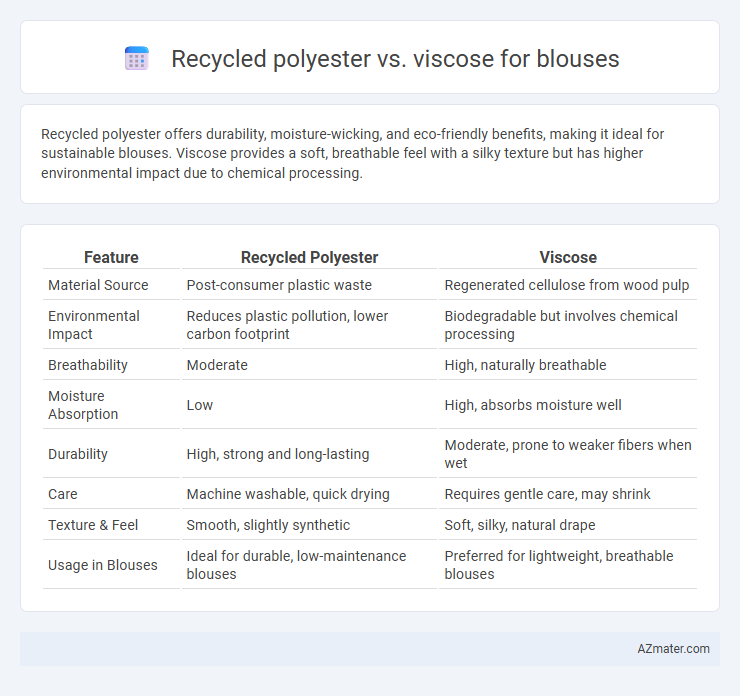Recycled polyester offers durability, moisture-wicking, and eco-friendly benefits, making it ideal for sustainable blouses. Viscose provides a soft, breathable feel with a silky texture but has higher environmental impact due to chemical processing.
Table of Comparison
| Feature | Recycled Polyester | Viscose |
|---|---|---|
| Material Source | Post-consumer plastic waste | Regenerated cellulose from wood pulp |
| Environmental Impact | Reduces plastic pollution, lower carbon footprint | Biodegradable but involves chemical processing |
| Breathability | Moderate | High, naturally breathable |
| Moisture Absorption | Low | High, absorbs moisture well |
| Durability | High, strong and long-lasting | Moderate, prone to weaker fibers when wet |
| Care | Machine washable, quick drying | Requires gentle care, may shrink |
| Texture & Feel | Smooth, slightly synthetic | Soft, silky, natural drape |
| Usage in Blouses | Ideal for durable, low-maintenance blouses | Preferred for lightweight, breathable blouses |
Introduction to Sustainable Fabrics: Recycled Polyester and Viscose
Recycled polyester blends post-consumer plastic waste into durable, moisture-wicking fabrics ideal for blouses, reducing reliance on virgin petroleum and lowering environmental impact. Viscose, derived from renewable wood pulp, offers a soft, breathable feel and biodegradability, though its production raises concerns over chemical use and deforestation. Choosing between recycled polyester and viscose involves balancing durability, sustainability credentials, and comfort for eco-conscious blouse design.
What is Recycled Polyester?
Recycled polyester is a sustainable fabric made from post-consumer plastic waste, such as PET bottles, which are processed and transformed into fibers suitable for clothing like blouses. It offers durability, moisture-wicking properties, and resistance to shrinking compared to viscose, which is a semi-synthetic fiber derived from wood pulp with a softer, more breathable feel. Choosing recycled polyester contributes to reducing plastic pollution and lowers the environmental impact associated with virgin polyester production.
What is Viscose?
Viscose is a semi-synthetic fiber made from regenerated cellulose, typically derived from wood pulp, offering a soft and breathable fabric ideal for blouses. Compared to recycled polyester, viscose is more environmentally friendly due to its biodegradable nature, though it requires significant water and chemical use during production. The choice between viscose and recycled polyester depends on balancing comfort, sustainability, and durability in blouse manufacturing.
Environmental Impact: Recycled Polyester vs Viscose
Recycled polyester significantly reduces plastic waste by repurposing PET bottles, lowering carbon emissions compared to virgin polyester production, while viscose, derived from cellulose fibers, involves deforestation and high water consumption, raising environmental concerns. The chemical-intensive process for viscose often leads to toxic wastewater affecting ecosystems, whereas recycled polyester's environmental footprint is diminished through waste reuse but still relies on non-renewable fossil fuels. Choosing recycled polyester for blouses supports circular fashion initiatives by minimizing landfill contributions, whereas viscose's biodegradability offers some environmental benefits but is offset by resource-intensive manufacturing.
Fabric Characteristics: Texture and Feel
Recycled polyester offers a smooth, slightly glossy texture with excellent durability and wrinkle resistance, making it ideal for blouses requiring easy care and long-lasting wear. Viscose features a soft, silky feel with excellent breathability and drape, providing a lightweight and comfortable fabric that mimics natural fibers. While recycled polyester tends to feel more synthetic and less breathable, viscose delivers superior softness and moisture absorption, enhancing comfort in warmer climates.
Durability and Longevity Comparison
Recycled polyester offers superior durability and longevity for blouses due to its strong synthetic fibers that resist stretching, shrinking, and wrinkling. Viscose, while soft and breathable, tends to wear out faster, showing signs of pilling and fabric weakening after repeated washing. Choosing recycled polyester ensures a blouse maintains shape and color over time, making it a more sustainable and long-lasting fabric option.
Breathability and Comfort in Blouses
Recycled polyester offers durability and moisture-wicking properties, making it suitable for blouses that require easy maintenance and quick drying. Viscose, derived from natural cellulose fibers, provides superior breathability and a soft, lightweight feel, enhancing comfort in warmer climates. Blouses made from viscose typically allow better air circulation, reducing sweat buildup compared to recycled polyester fabrics.
Care and Maintenance: Washing and Lifespan
Recycled polyester blouses offer superior durability and resistance to shrinking and wrinkles, allowing for machine washing at lower temperatures and longer lifespan compared to viscose. Viscose garments require gentle hand washing or delicate machine cycles with cold water to prevent fiber weakening and maintain fabric softness, which can shorten their overall lifespan. Proper care extends the longevity of recycled polyester blouses by minimizing color fading and deformation, while viscose demands careful maintenance to avoid premature wear and fabric damage.
Cost and Accessibility for Consumers
Recycled polyester offers a cost-effective option for blouses, with prices generally lower than viscose due to its production from post-consumer plastic waste, making it highly accessible to budget-conscious consumers. Viscose, derived from wood pulp, tends to be more expensive and less widely available, especially in sustainable or eco-friendly collections that prioritize ethical sourcing and manufacturing. Consumers seeking affordable and readily accessible blouses often find recycled polyester in a wider range of mainstream retail outlets compared to viscose, which is commonly found in specialty or premium fashion stores.
Choosing the Right Fabric for Sustainable Fashion
Recycled polyester offers durability and moisture-wicking properties made from post-consumer plastic, reducing landfill waste and carbon footprint, making it a practical choice for sustainable blouse production. Viscose, derived from renewable wood pulp sources, provides a soft, breathable, and biodegradable fabric option but often involves chemical-intensive manufacturing processes that impact sustainability. Opting for recycled polyester ensures long-lasting wear and circularity, whereas responsibly sourced and lyocell-processed viscose aligns with eco-friendly fashion goals, highlighting the need to balance material origin, production impact, and garment lifecycle in fabric selection.

Infographic: Recycled polyester vs Viscose for Blouse
 azmater.com
azmater.com